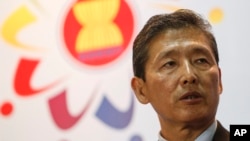Recent rhetoric from North Korea is aimed at probing the United States' readiness to resume negotiations on the North's nuclear program, according to experts on North Korea.
“[The] statements out of Pyongyang are often designed to get our attention and probe our willingness to engage in direct talks,” Frank Jannuzi, president of the Mansfield Foundation, a nonprofit that advocates for better U.S-Asia understanding and cooperation, told VOA on Friday.
The longtime North Korea watcher was referring to a high-level North Korean official’s remarks at a news conference Thursday, held in Kuala Lumpur on the sidelines of the ASEAN Regional Forum.
Future nuclear tests by the communist country will depend on the United States’ attitude, said Ri Tong II, a spokesman for North Korean Foreign Minister Ri Su Yong. “The U.S. is hell-bent on increased level of provocations in front of the door of DPRK,” Ri argued during the news conference.
The North’s former deputy ambassador to the United Nations said Pyongyang has to defend itself in the face of Washington’s “hostile” stance toward the country.
“The DPRK has no other option but to have self-defensive means to safeguard sovereignty, national dignity, and to protect our people from nuclear disaster," Ri said, using the North’s official name, the Democratic People’s Republic of Korea.
Pressure at forum?
It is rare for Pyongyang officials to hold such a news conference at international meetings, said Gregg Brazinsky, a specialist on U.S.-East Asian relations at George Washington University in Washington.
“The cause might be that North Korea was coming under a great deal of pressure and criticism from some of the other countries at the [ASEAN forum] to continue with the six-party talks, especially after the [Iran nuclear deal],” he said.
North Korea watchers in South Korea offered similar analyses. Nam Gwang-gyu, professor at Korea University’s Asiatic Research Institute, said Pyongyang appears to be on a pre-emptive offensive to counter growing international pressure on the regime regarding its nuclear program and human rights violations.
“The North Korean diplomats are determined to praise Kim’s leadership in and out of the country due to growing pressure from the international community,” Nam said.
Nam also said the regime of Kim Jong Un is trying to create leverage ahead of future negotiations with the U.S.
“North Korea, at its core, wants to engage in talks with the U.S.," he said. "Thursday’s statement can be seen as Pyongyang’s ironic way of communicating that wish to Washington.”
Brazinsky, for his part, does not see bilateral talks between the U.S. and North Korea in the near future. “I don't think this is necessarily an effort by Pyongyang to resume talks with Washington. I have not seen any evidence that North Korea has softened its position on the nuclear issue,” he said.
Blame game
Pyongyang is playing the blame game, said Jannuzi, who served as policy director of East Asian and Pacific affairs for the U.S. Senate Foreign Relations Committee.
“[It] hopes to shift the burden for the failure to resume dialogue from their shoulders to those of the United States," he said. "They have long portrayed their nuclear program as a response to alleged U.S. ‘hostile policy.’
"But this is belied by the fact that they accelerated their development of uranium enrichment efforts and sustained their nuclear weapons research even as the United States was implementing the Agreed Framework,” he added.
The Agreed Framework between Washington and Pyongyang was signed on October 21, 1994. The objective was the freezing and replacing of North Korea's indigenous nuclear program with light water reactor power plants, in return for the gradual normalization of relations between the two countries.
It effectively broke down less than a decade later in 2003, and North Korea has conducted three nuclear tests since 2006. The reclusive regime threatened to conduct a new form of nuclear testing last year, prompting many to speculate on whether it will be based on uranium.
Some Washington-based North Korea watchers have warned the country’s nuclear arsenal could expand to up to 100 bombs by 2020.
Kim Hwan Yong contributed to this report from Seoul.





